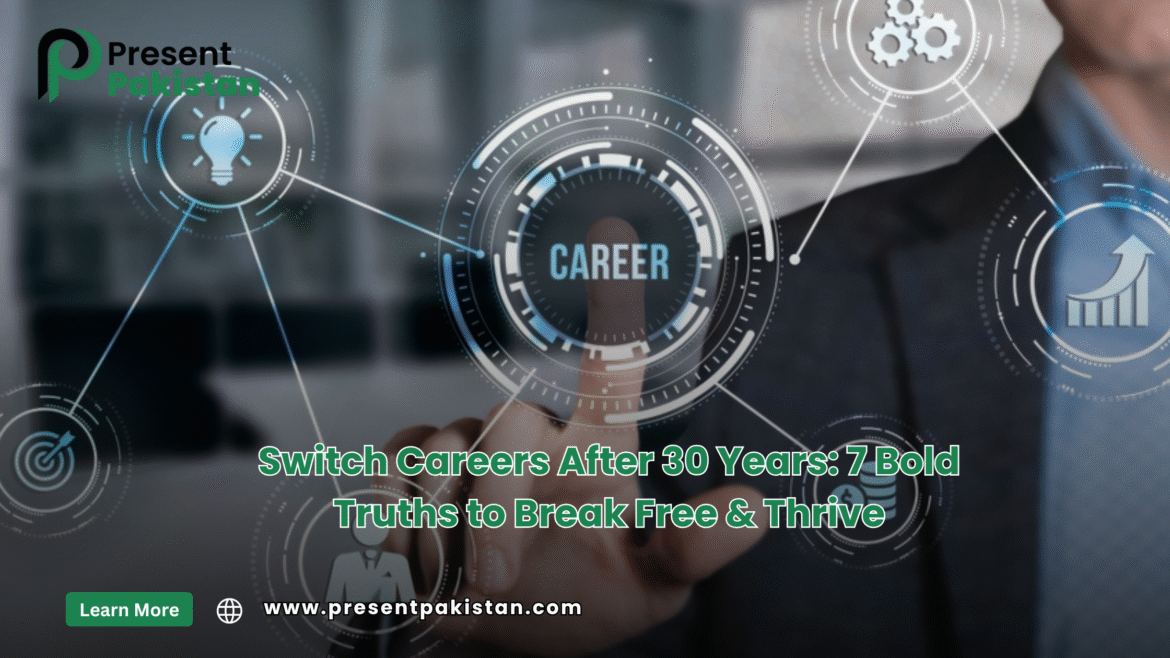Introduction
Change careers at age 30? It can seem like a peak too high to ascend; fear, uncertainty, age, and technology gaps are obstacles. But what if you’ve been believing myths? You’re not behind. You’re exactly on time. Increasingly, professionals are celebrating second careers, discovering purpose, financial increase, and independence in new careers.
In this book, you will find out precisely how to seize control of your next act, enhance your abilities, and enter a new career confidently. Whether you’re looking into freelancing, online marketing, consulting, or leading a nonprofit, it’s time to tap back into your power and leverage it.
Career planning information can be found under career development guidance
Examine your choices with career change guides
Discover how to reinvent your professional self at the Professional Reinvention Support
Table of Contents
- Why Switching Careers After 30 Years Is Not Too Late
- Identifying Your Transferable Strengths
- Strategic Planning for a Second Career
- Upskilling: Learn New Tools, Beat the Gap
- Real-Life Career Switch Success Stories
- Navigating Emotional & Social Challenges
- Top Career Fields for Late-Starters
- FAQs
- People Also Ask
- Conclusion
1. Why Career Change at 30 Years Old Isn’t Too Late
Everyone thinks career changes are for young folks. That’s a myth. Actually, the typical individual now has 5–7 careers throughout their lifetime. You’re not behind — you’re merely starting your next level.
Technology has opened doors of opportunities into remote employment, consultancy, coaching, and entrepreneurship. Your decades of experience are your greatest possessions, not your handicaps.
Key Points:
- 30+ yrs work experience translates to in-depth industry knowledge & interpersonal skills
- Late-career changes are gaining popularity worldwide
2. Finding Your Transferable Strengths
Take inventory of what you already possess, your transferable skills, before you dive into something new. These are the skills that can be used for any job, no matter the field.
Examples:
- Leadership
- Problem-solving
- Communication
- Project management
- Negotiation
- Training & mentoring
Action Tip: Take a skills inventory with tools such as Indeed’s Skill Assessment Tool.
Key Points:
- Most skills are industry-neutral
- Your confidence begins with knowing your worth
3. Second Career Strategic Planning
A successful career transition never happens by chance. You require a step-by-step career change plan:
Step 1: Determine Your WHY
Why do you need a change, burnout, passion, financial necessity, or freedom?
Step 2: Explore Growth Fields
Research new fields such as digital marketing, UX design, healthcare coaching, or nonprofits.
Step 3: Financial Planning
Can you sustain a pay cut or an unpaid training interval? Build a 6-month runway.
Step 4: Define SMART Goals
Begin small. Attempt to apply for 2 new jobs weekly, finish 1 course/month, or create a portfolio.
Key Point:
- Planning reduces emotional stress
4. Upskilling: Acquire New Tools, Overcome the Gap
Learning is no longer confined to the classroom. There are hundreds of free and paid websites that assist you in reskilling or upskilling for today’s job market.
Suggested Websites:
Coursera
LinkedIn Learning
Online platform
Skillshare
Pay attention to:
- Digital literacy
- Email & online collaboration tools
- Marketing & branding fundamentals
- Communication & remote collaboration
- Research + clarity = effective action
Key Points:
- Skills matter more than degrees in today’s market
- Lifelong learning keeps your brain sharp and your resume relevant
5. Real-Life Career Change Success Stories
John, 58.Factory Manager to UX Designer
Having worked in manufacturing for 34 years, John attended a UX Bootcamp. Within a year, he was hired by a design firm and now mentors late-career professionals who are considering a switch.
Nabila, 52, From Teacher to Digital Coach
Nabila learned about content strategy and now educates small business owners to develop online. She has an advantage with her teaching experience.
Key Point
- Career success is possible at any age
- Experience becomes an advantage in mentorship or leadership roles
6. Managing Emotional & Social Obstacles
Shared Obstacles:
- Fear of failure
- Imposter syndrome
- Family skepticism
- Age bias
Solutions:
- Participate in support groups
- Get a mentor
- Use affirmations
- Update your resume in new formats
Remember: You’re not beginning from scratch, you’re beginning from experience.
Key Points:
- Emotional fitness matters during transitions
- Establish a new support group around your professional aspirations
7. Best Career Areas for Late-Starters
You don’t need to begin as an intern. These fields tend to appreciate maturity, communication skills, and dependability.
Best Choices:
- Coaching & Mentorship
- Virtual Assistance
- Nonprofit leadership
- Digital marketing
- Tech sales & support
Freelancing (design, writing, consulting)
Key Points:
- Select growth industries with flexibility
- Align your personality & purpose with new positions
8. FAQs
Can I change careers after 30 years?
Yes, changing careers at age 30 is not only possible, it’s on the rise as individuals are looking for meaning and flexibility later in life.
How do I transition to a new career at 50 or older?
Start with research, assessing your skills, and upskilling. Then, gradually create experience, even if through freelancing or volunteering.
Do employers recruit older career changers?
Others do, particularly in industries where maturity, leadership, and communication are most prized, like coaching, non-profits, education, and consulting.
What are the best careers for older workers?
Careers in virtual work, cyber support, customer care, virtual assistance, and coaching are well-suited for older professionals.
What happens if I fail in my second career?
Failure is a teacher. Most successful professionals failed first, then persisted and grew through risk.
9. People Also Ask (PAA)
How do I start a new career at 50 with no experience?
Begin with transferable skills. Most soft skills, such as communication, leadership, and adaptability, are highly transferable across industries. Couple these with inexpensive online certifications to become credible. Volunteering or internships also establish experience.
Is it worth starting over in a new career?
Yes, if it makes you happy, balanced, or wealthier. Most people feel more satisfied and less exhausted in second careers, particularly when the career is tied to strong personal values.
What are good second careers for individuals over 50?
Second careers that do not demand physical expense and provide flexibility, meaning, and people connection are best. These are digital marketing, virtual coaching, social media management, nonprofit, and freelance work.
How do I handle age discrimination when applying for a job?
Have a contemporary resume structure, emphasize your accomplishments (not age), and reskill in modern tools. Additionally, seek age-friendly employers and develop a robust LinkedIn profile.
Can I start being self-employed at 30 years in the job?
Yes. Numerous later-in-life professionals turn into consultants, freelancers, or small business entrepreneurs. You already possess knowledge — now it is about selling and branding it.
10. Conclusion:
From Stuck to Strong
It takes courage to make a career change in midlife, but it’s one of the strongest things you can do. You’re stronger, wiser, and more ready than ever.
Begin with a plan. See what you require. Get assistance. Take the first step today, because your second act could be your best one yet.
Ready to get started? Find tools, templates, and job boards at
professional reinvention support







